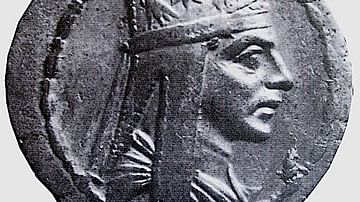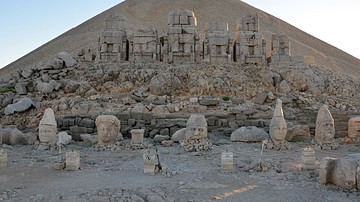Search
Did you mean: Parthia (Empire)?
Search Results

Definition
Artaxiad Dynasty
The Artaxiad (Artashesian) dynasty ruled ancient Armenia from c. 200 BCE to the first decade of the 1st century CE. Founded by Artaxias I, the dynasty would ensure Armenia enjoyed a sustained period of prosperity and regional importance...

Definition
Empire
An empire is a political construct in which one state dominates over another state, or a series of states. At its heart, an empire is ruled by an emperor, even though many states in history without an emperor at their head are called "empires"...

Article
Battle of Carrhae, 53 BCE
The Battle of Carrhae in 53 BCE was one of the greatest military catastrophes in all of Roman history when a hero of the Spartacus campaign, Marcus Licinius Crassus (115-53 BCE), initiated an unprovoked invasion of Parthian territory (modern...

Definition
Alexander Helios
Alexander Helios (40 BCE – c. late 1st century BCE) was a member of the Ptolemaic dynasty, the second oldest son of Cleopatra VII (69 BCE – 30 BCE) and the twin brother of Cleopatra Selene II (40 BCE – 5 BCE). He spent the majority of his...

Definition
Gurjara-Pratihara Empire
The Gurjara-Pratiharas, or simply, the Pratiharas (8th century CE - 11th century CE) held their sway over western and northern India. This dynasty saw its fortunes rising under Nagabhata I (730–760 CE) who successfully defeated Arab invaders...

Article
Cortés & the Fall of the Aztec Empire
The Aztec empire flourished between c. 1345 and 1521 CE and dominated ancient Mesoamerica. This young and warlike nation was highly successful in spreading its reach and gaining fabulous wealth, but then all too quickly came the strange visitors...

Definition
Tigranes the Great
Tigranes II or Tigranes the Great ruled as the king of Armenia from c. 95 to c. 56 BCE. Expanding in all directions, at its peak, Tigranes' Armenian Empire stretched from the Black Sea to the Mediterranean. Not before or since would Armenians...

Definition
Commagene
The Kingdom of Commagene (163 BCE - 72 CE) was a Hellenistic political entity, heavily influenced by Armenian and ancient Persian culture and traditions, established in southwestern Anatolia (modern-day Turkey) by Ptolemaeus of Commagene...

Article
Sassanian Kings List & Commentary
The Sassanian Empire (224-651) was the greatest expression of Persian culture in the ancient world. It was consciously modeled on the earlier Achaemenid Empire (c. 550-330 BCE) which established Persian supremacy in the region and developed...

Article
The Battle of Actium: Birth of an Empire
The battle of Cynoscephalae in 197 BCE concluded the Second Macedonian War (200-197 BCE) and consolidated Rome's power in the Mediterranean, finally resulting in Greece becoming a province of Rome in 146 BCE. This engagement is sometimes...